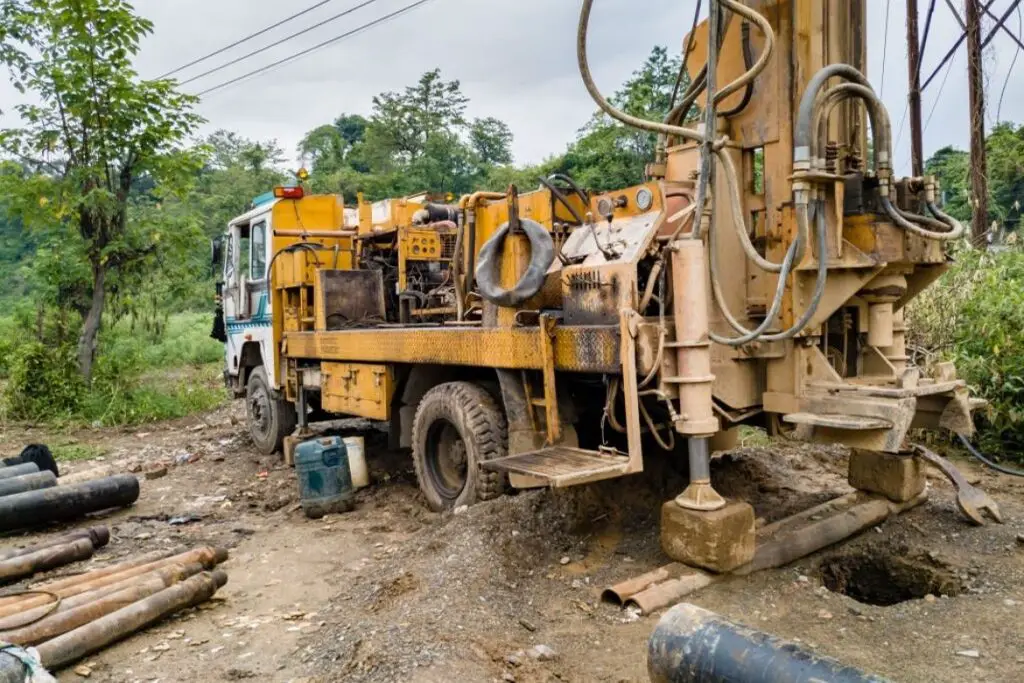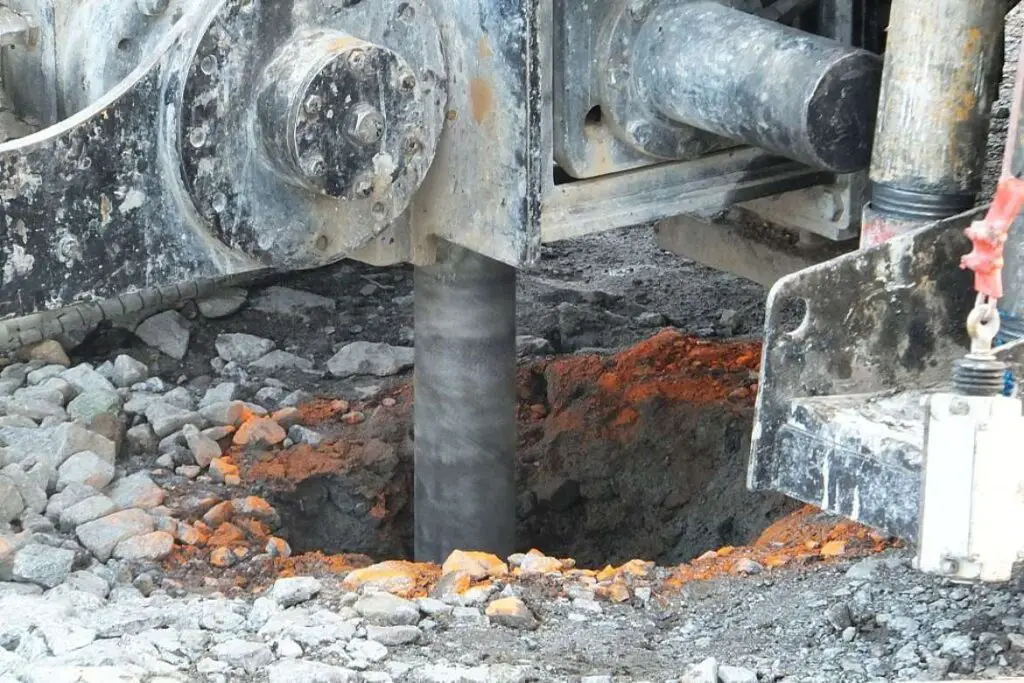Table of Contents
Water is the most important resource for agricultural activities and development. In terms of water usage, irrigation amounts to 70% of the global freshwater withdrawals.
Groundwater is being used extensively for irrigation. For instance, in the state of Maharashtra, 71% (28.75 lakh hectares) of agricultural land is irrigated by groundwater, while 29% (11.83 lakh hectares) of agricultural land is irrigated by canals or flow irrigation.
This article will try to give you a complete guide for setting up a borewell, right from getting permission to maintenance.
What to do before digging a borewell
- Get the appropriate borewell digging permission from the local Municipal Corporation ( Mandal ) level (which will report to the groundwater authority). You will be required to submit an application for approval of your borewell digging request. Few application example/template can be seen here (Andhra pradesh borewell application template), here (Maharashtra borewell digging application template).
- You will receive an NOC from the respective body and the required survey of the desired borewell location will be done by state authority. We have also written a complete procedure of acquiring borewell digging permission.
The NOC guidelines created by the government (CENTRAL GROUND WATER AUTHORITY) for borewell digging can be found here.
Identification of borewell digging location / point
There is water under almost every part of the earth’s surface, but underground water is not always easy to find, and once found, it may not easily be accessed.
The amount of water in an area depends on factors such as rainfall, topography, hydrogeology, and recharge and discharge.
Hydrogeology is the study of the movement and distribution of ground water in the soils and rocks of the Earth’s crust. This is a branch of geology, and one who investigates these phenomena is known as a hydrogeologist.
It is always advisable to hire a hydrogeologist for identification of borewell digging location in your land who will be able to provide you with a reliable estimate of water level and the depth. Hydrogeologist will survey the land and locate the appropriate borewell digging points. Average fees of a hydrogeologist is about 1000 rupees/acre. So, as an example, survey of 5 acres of land for determining borewell digging locations can cost you 1000×5= 5000 INR.
Local well diviners are also capable of identifying borewell sites to some extent using sticks or magnetic blocks. However, this method may not always be reliable, especially in areas where the geological formation and location is crucial.
The bore well site should be accessible for cleaning, testing, monitoring, maintenance and repair.
Best suitable time for drilling a borewell
There is no prescribed season for drilling a borewell if the location of the site possesses adequate ground water resources.
Experts often consider summer months to be the best time for locating a new borewell site and drilling the borewell, as it will give the exact idea of minimum waterlevel available.
Furthermore, most agricultural sites can only be accessed by drilling rigs during the summer.

Common methods of drilling borewell
The method of drilling borewell, depends on a number of factors, such as its suitability for a particular type of geological location and soil (e.g. bouldery soil, hard rock soil, alluvial soil), cost, borewell diameter and depth, and the purpose of the borewell intended.
- Water Jetting – Shallow bores in alluvial soil
- Augur Drilling – Shallow bores in alluvial soil
- Calyx Drilling – Shallow borewell in both hard rock and alluvial soil
- Percussion Drilling – Deep bores in bouldery soil
- Rotary Drilling – Most common method used for drilling large and deep bores in alluvial soil
- Down the Hole Hammering (DTH) Drilling – Most common method for drilling large and deep borewells in hard rock soil
Standard diameter of borewells
4.5 and 6 inches are the most commonly used standard diameters of borewells. 4.5 inches is used for smaller apartments and homes, where as 6 inches diameter borewell is usually drilled for bigger houses or agricultural purposes.

Borewell drilling cost and borewell casing cost
The borewell drilling cost calculated in this section is subjected to change depending on the your location and fuel prices. For ease of calculation and getting an estimate close to the actual cost lets assume the following average borewell drilling rates:
| Borewell drill depth (Feets) | Borewell Drilling rate / Cost |
|---|---|
| <100 (Less than 100 feet) | 70-80 INR / Feet |
| >100 (More than 100 feet but less than 200 feet) | 90-100 INR / Feet |
| >200 (More than 200 feet) | 110 - 120 INR / Feet |
As the borewell is being drilled, the inner wall of borewell is encased by casing pipes. The use of PVC pipes as casing pipes is widespread as opposed to GI/Mild steel casing pipes ( because metal casing pipes are infamus for corrosion problems).
PVC casing pipes used in borewells must comply with IS 12818: 1992 of the Bureau of Indian Standards regarding the specification for unplasticized PVC screen and casing pipes
Average borewell casing pipe price per feet is 200 rupees/feet. Traditionally, casing depth of 40 feet is preferred.
Cost of borewell casing for 40 feet = 40 x 200 = 8000 INR.
Following is the total average borewell drilling cost estimate of 200 feet along with casing cost / charges:
| Activity | Unit rate | Total rate (INR) |
|---|---|---|
| Drilling first 100 feet | 80 rupees / feet | 8000 |
| Drilling 100-200 feet | 100 rupees / feet | 10000 |
| PVC casing cost | 200 rupees / feet | 8000 |
| Labor charges (PVC casing installation, machinery handling etc) | 2000 | |
| Table (1) | Total borewell cost | 28000 |
All the above cost incurred is just the borewell cost of drilling.
Equipment needed for new borewell setup
Setting up of a new borewell required the following equipments:
- Submersible motor pump
A pump which is put in the borewell to pump the underground water vertically up directly to the field or water storage tanks. - Pump starter Box
It acts like a safety net. It is used to prevent overload and short circuit. - Bore Pipes (20 feet each)
- Cable wire from motor to starter box
- Service wire from power pole to starter box
- Pipe gate valves
- Metal clips and miscellaneous GA wires etc.
Popular submersible pump brands and pump price
- Texmo
Texmo 5 HP Borewell Submersible Pump price (Single phase) = 33200 rupees (approximately)
Texmo 3 HP Borewell Submersible Pump price (Single phase) = 27400 rupees (approximately) - CRI
CRI 5 HP Borewell Submersible Pump price (Single phase) = 26200 – 40600 rupees (approximately)
CRI 3 HP Borewell Submersible Pump price (Single phase) = 25000 – 31000 rupees (approximately) - Kirloskar
Kirlosker 5 HP Borewell Submersible Pump price (Single phase) = 30000 rupees (approximately)
Kirlosker 3 HP Borewell Submersible Pump price (Single phase) = 25800 rupees (approximately) - Crompton
Crompton 5 HP Borewell Submersible Pump price (Single phase) = 34700 – 41900 rupees (approximately)
Crompton 3 HP Borewell Submersible Pump price (Single phase) = 22150 rupees (approximately) - KSB
KSB 5 HP Borewell Submersible Pump price (Single phase) = 40300 rupees (approximately)
KSB 3 HP Borewell Submersible Pump price (Single phase) = 24000 – 34000 rupees (approximately)
The above borewell motor price / borewell machine price are subjected to change and are representative of prices when this article was written.
Total borewell drilling and setup cost
For the purpose of calculating the total cost of drilling borewell and setting up borewell, we have made the following assumptions:
- Submersible water motor / pump cost = 33000 Rupees
- A decent pump starter box cost / price can be between 3100 up -to 9000 rupees (in some cases, even 40000 rupees). Lets assume an average price of pump starter box = 5000 Rupees
- Cable wire cost from submersible motor to starter box (200 feet) = 10000 Rupees
- Bore pipe cost per 20 feet = 650 rupees
Assuming the submersible pump depth to be 160 feet, we will require 8 segments of 20 feet bore pipe
Total cost of bore pipe for 200 feet borewell = 8 x 650 = 5200 - Service wire cost from electric pole to starterbox = 2500 Rupees
- Lets assume the average price of pipe gate valve = 2500 Rupees
- Electrician and labor charges = 3000 Rupees
| Equipment and Services | Unit Price / Cost (INR) | Total Price / Cost (INR) |
|---|---|---|
| Submersible water motor / pump cost | 33000 | 33000 |
| Pump starter box price | 5000 | 5000 |
| Cable wire cost from submersible motor to starter box (200 Feet) | 10000 | 10000 |
| Bore pipe cost (20 feet x 8 = 160 feet) | 650 INR x 8 = 5200 | 5200 |
| Service wire cost from electric pole to starterbox | 2500 | 2500 |
| Pipe gate valve | 2500 | 2500 |
| Electrician and labor charges | 3000 | 3000 |
| Table (2) | Total cost of Equipment and assembling | 61200 |
Total borewell cost of drilling, machines and assembly = Table (1) + Table (2) = 28000 + 61200 = 89200 Rupees.
* Remember that we have NOT included material transportation charges and flushing charges (charged per hour after drilling of borewell) in this calculation and hence the total cost calculated for borewell drilling and setup might increase a little.
* Slotted PVC casing pipes are used when borewell is drilled in sandy soil. This prevents the borewell from sinking and collapsing, and also prevents fine sand from getting into the borewell. Sandy soil also requires gravel packing around the casing. All this additionl steps will increase the total cost of borewell drilling and setup.


